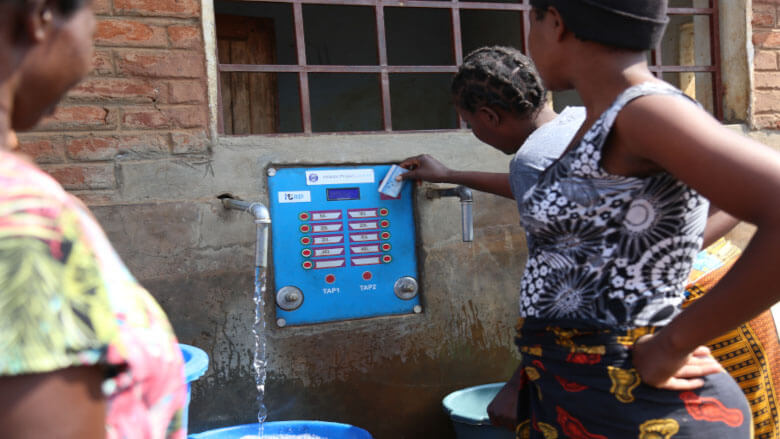BV features a report from the World Bank on water initiatives in Africa to combat the transmission of Covid-19
LIKE many Malawians who live in the peri-urban areas of the capital city, Mary Kooneka’s home does not have running water. To get water for her family, she makes frequent trips to a kiosk in her Mchezi neighbourhood, with cash to pay the attendant.
During the limited hours of the manually-operated kiosk — three hours in the morning and three hours in the evening — congestion was common, increasing the risk of spreading Covid-19. And, at one Malawi kwacha per litre of water, costs were high for those dependent on water kiosks, making it difficult to engage in the increased hygiene and handwashing practices recommended by the government to help mitigate the spread of the coronavirus.
“I used to receive cash directly from water users as they come to draw water, which is a health risk in this time of COVID-19,” said Chrissy Kawanga, a former kiosk manager.

In response to community concerns, the Lilongwe Water Board (LWB) began the installation of E-Madzi kiosks, fully-automated systems allowing users to draw water using an e-card. The E-Madzi kiosks gives residents access to water at any time. The system has also enabled a 65 percent reduction in water costs, because there is no longer need for an attendant, and no waste. With this technology, about 8,750 customers in some of the city’s vulnerable neighbourhoods are now able to access water for improved hygiene practices and handwashing to prevent COVID-19.
The government is supporting the kiosk installment through its implementation of the World Bank-financed Lilongwe Water and Sanitation Project. Soon, what started as a pilot programme with four kiosks in 2019, will increase to 35 additional kiosks around Lilongwe. More funds for the scale-up came from the recently-approved Covid-19 response package financed by the bank.
In addition to the kiosks, the package includes installation of public handwashing facilities in public places across the city led by Lilongwe City Council, training and awareness campaigns on handwashing, and protective equipment for LWB frontline staff.
“The E-Madzi kiosks have simplified the way we manage water kiosks, especially, that we do not need an employee of the water board to be available to sell water and receive cash while ensuring water is available all the time,” said John Maweja, a Lilongwe Water Board kiosk technician.
The E-Madzi system is comprised of three main elements: a smartcard, a dispenser unit and a water management system. The system is installed at a kiosk and is operated through an electronic water management device. The card uses Radio-Frequency Identification (RFID) technology to allow users to draw water by tapping on the dispenser unit.
Consumers with a prepaid smartcard only tap the water dispenser, and credit is deducted from the smartcard balance to the exact amount of water collected. The technology helps to reduce water wastage due to spillage and non-revenue water. The Water Management System Server captures all the reports from remote kiosks to enable LWB system administrators to remotely monitor the performance and water usage of the kiosk through an easy-to-use web-based dashboard.
“This system is a very useful platform to ensures continuity of water supply services to some of the most vulnerable communities in Lilongwe, at times when water is most needed,” said Odete Muximpua, World Bank task team leader of the LWSP. “The system minimises human contact, thus reducing the risk of contamination from taps during opening and closing, and cash payment transactions at the kiosk.”
The cashless system further improves the collection efficiency by the water service provider. The supply and installation work for the system costs about $41,500.
“This system is easy to use and suitable for installation in congested and Covid-19 risk areas like schools, hospitals, bus stations or community meeting places,” said Muximpua. “Congested areas need to have services with reduced contact to minimise the risk of transferring the coronavirus.”




























